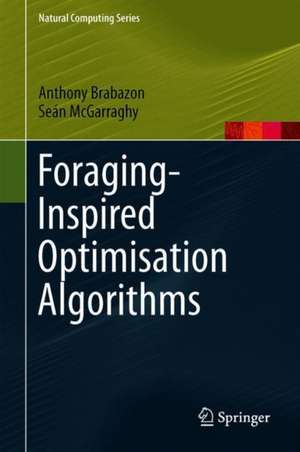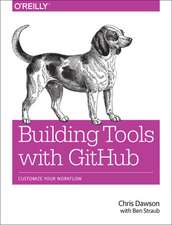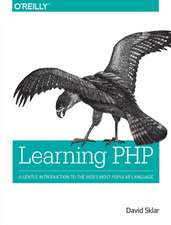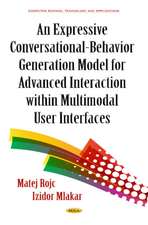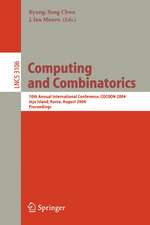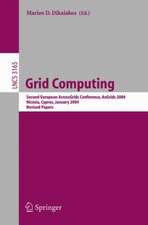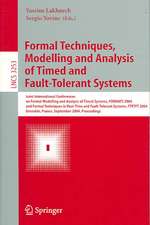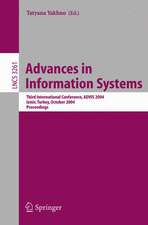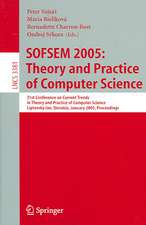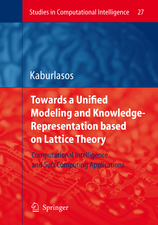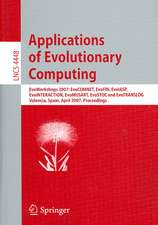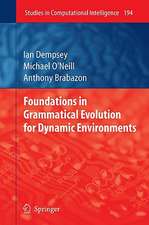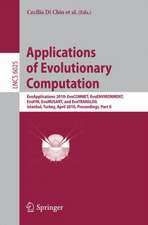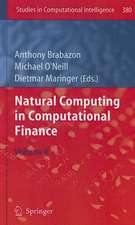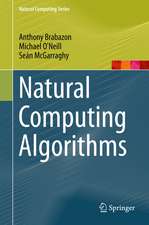Foraging-Inspired Optimisation Algorithms: Natural Computing Series
Autor Anthony Brabazon, Seán McGarraghyen Limba Engleză Hardback – 6 oct 2018
No prior knowledge of natural computing is assumed. This book will be of particular interest to graduate students, academics and practitioners in computer science, informatics, data science, management science, and other application domains.
| Toate formatele și edițiile | Preț | Express |
|---|---|---|
| Paperback (1) | 342.28 lei 6-8 săpt. | |
| Springer International Publishing – 11 feb 2019 | 342.28 lei 6-8 săpt. | |
| Hardback (1) | 491.20 lei 6-8 săpt. | |
| Springer International Publishing – 6 oct 2018 | 491.20 lei 6-8 săpt. |
Din seria Natural Computing Series
- 20%
 Preț: 507.38 lei
Preț: 507.38 lei - 20%
 Preț: 305.91 lei
Preț: 305.91 lei - 20%
 Preț: 992.26 lei
Preț: 992.26 lei - 20%
 Preț: 617.14 lei
Preț: 617.14 lei - 20%
 Preț: 645.47 lei
Preț: 645.47 lei - 20%
 Preț: 642.65 lei
Preț: 642.65 lei - 20%
 Preț: 998.04 lei
Preț: 998.04 lei - 18%
 Preț: 963.60 lei
Preț: 963.60 lei - 20%
 Preț: 655.20 lei
Preț: 655.20 lei - 20%
 Preț: 615.70 lei
Preț: 615.70 lei - 20%
 Preț: 645.65 lei
Preț: 645.65 lei - 20%
 Preț: 640.19 lei
Preț: 640.19 lei - 20%
 Preț: 655.02 lei
Preț: 655.02 lei -
 Preț: 384.70 lei
Preț: 384.70 lei - 20%
 Preț: 652.54 lei
Preț: 652.54 lei - 20%
 Preț: 649.28 lei
Preț: 649.28 lei - 20%
 Preț: 330.75 lei
Preț: 330.75 lei - 20%
 Preț: 328.09 lei
Preț: 328.09 lei -
 Preț: 389.70 lei
Preț: 389.70 lei - 20%
 Preț: 644.66 lei
Preț: 644.66 lei - 20%
 Preț: 333.88 lei
Preț: 333.88 lei - 20%
 Preț: 1299.31 lei
Preț: 1299.31 lei - 20%
 Preț: 528.47 lei
Preț: 528.47 lei - 20%
 Preț: 648.11 lei
Preț: 648.11 lei - 15%
 Preț: 639.90 lei
Preț: 639.90 lei - 20%
 Preț: 322.43 lei
Preț: 322.43 lei - 20%
 Preț: 657.83 lei
Preț: 657.83 lei - 20%
 Preț: 659.31 lei
Preț: 659.31 lei - 20%
 Preț: 997.56 lei
Preț: 997.56 lei - 20%
 Preț: 508.61 lei
Preț: 508.61 lei -
 Preț: 400.85 lei
Preț: 400.85 lei - 20%
 Preț: 653.38 lei
Preț: 653.38 lei - 20%
 Preț: 308.60 lei
Preț: 308.60 lei - 20%
 Preț: 654.05 lei
Preț: 654.05 lei - 15%
 Preț: 652.17 lei
Preț: 652.17 lei - 20%
 Preț: 336.54 lei
Preț: 336.54 lei - 20%
 Preț: 656.19 lei
Preț: 656.19 lei
Preț: 491.20 lei
Preț vechi: 614.00 lei
-20% Nou
Puncte Express: 737
Preț estimativ în valută:
94.00€ • 97.78$ • 77.60£
94.00€ • 97.78$ • 77.60£
Carte tipărită la comandă
Livrare economică 14-28 aprilie
Preluare comenzi: 021 569.72.76
Specificații
ISBN-13: 9783319591551
ISBN-10: 331959155X
Pagini: 478
Ilustrații: XVIII, 478 p.
Dimensiuni: 155 x 235 mm
Greutate: 0.87 kg
Ediția:1st ed. 2018
Editura: Springer International Publishing
Colecția Springer
Seria Natural Computing Series
Locul publicării:Cham, Switzerland
ISBN-10: 331959155X
Pagini: 478
Ilustrații: XVIII, 478 p.
Dimensiuni: 155 x 235 mm
Greutate: 0.87 kg
Ediția:1st ed. 2018
Editura: Springer International Publishing
Colecția Springer
Seria Natural Computing Series
Locul publicării:Cham, Switzerland
Cuprins
Introduction.- Formal Models of Foraging.- Sensor Modalities.- Individual and Social Learning.- Introduction to Foraging Algorithms.- Mammals.- Bird Foraging Algorithms.- Fish Algorithms.- Ant Foraging Algorithms.- Honeybee Inspired Algorithms.- Bioluminescence Algorithms.- Spider Algorithms.- Worm Algorithm.- Bacteria Inspired Algorithms.- Slime Mould Foraging.- Plant Foraging Algorithms.- Group Search and Predatory Search.- Evolving Foraging Algorithms.- Conclusions.
Notă biografică
Prof. Anthony Brabazon is currently Dean of the UCD College of Business. Previous positions held in UCD include Associate Dean and Director of the Smurfit Graduate School of Business, Vice-Principal of Research and Innovation for the College of Business and Law, and Head of Research for the School of Business. His primary research interests concern the development of natural computing theory and the application of related algorithms to real-world problems, particularly in the domain of business and finance, and he has pioneered multidisciplinary collaborations with industry in areas such as financial mathematics, financial economics, and computer science. He is cofounder and codirector of the Natural Computing Research and Applications Group at UCD, among the most successful research groups dedicated to this subject. Among his publications are the successful coauthored books 'Natural Computing Algorithms', 'Foundations in Grammatical Evolution for DynamicEnvironments', and 'Biologically Inspired Algorithms for Financial Modelling'.
Dr. Seán McGarraghy is the director of the UCD Centre for Business Analytics, he was formerly director of the UCD Smurfit Graduate School of Business MSc in Business Analytics. He has qualifications in electronics, mathematics and management and his teaching and academic publications cover many aspects of business analytics and operations research. Particular topics of interests include combinatorial enumeration and optimization, network algorithms, supply chain management, quadratic forms and K-theory. Among his publications are the successful coauthored book 'Natural Computing Algorithms'.
Dr. Seán McGarraghy is the director of the UCD Centre for Business Analytics, he was formerly director of the UCD Smurfit Graduate School of Business MSc in Business Analytics. He has qualifications in electronics, mathematics and management and his teaching and academic publications cover many aspects of business analytics and operations research. Particular topics of interests include combinatorial enumeration and optimization, network algorithms, supply chain management, quadratic forms and K-theory. Among his publications are the successful coauthored book 'Natural Computing Algorithms'.
Textul de pe ultima copertă
This book is an introduction to relevant aspects of the foraging literature for algorithmic design, and an overview of key families of optimization algorithms that stem from a foraging metaphor. The authors first offer perspectives on foraging and foraging-inspired algorithms for optimization, they then explain the techniques inspired by the behaviors of vertebrates, invertebrates, and non-neuronal organisms, and they then discuss algorithms based on formal models of foraging, how to evolve a foraging strategy, and likely future developments.
No prior knowledge of natural computing is assumed. This book will be of particular interest to graduate students, academics and practitioners in computer science, informatics, data science, management science, and other application domains.
No prior knowledge of natural computing is assumed. This book will be of particular interest to graduate students, academics and practitioners in computer science, informatics, data science, management science, and other application domains.
Caracteristici
Understanding foraging strategies improves search processes No prior knowledge of natural computing assumed Valuable for graduate students, academics and practitioners in computer science, informatics, data science, and management science
